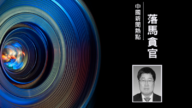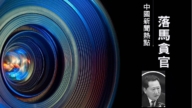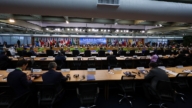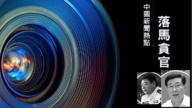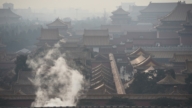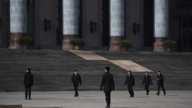【新唐人2013年01月16日讯】日本《朝日新闻》1月14号引述消息来源说,在1月9号的中南海会议上,中共新任总书记习近平,露出不快的神色,并质疑主管意识形态的政治局常委刘云山在“南周事件”上越压越乱。报导分析,刚刚起步的习近平,想极力避免问题扩大,甚至演变成动摇体制的事态。
《朝日新闻》报导强调,据了解当天会议内容的多名相关人士透露,1月9号晚间,在中南海中共中央会议上,统管媒体的刘云山,就《南方周末》事件作报告时,习近平先是露出不快的神色。随后,习近平在会议上质疑:“一系列的措施,反而只能加剧混乱。难道不是越压越乱吗?”
《南方周末》在1月3号被窜改新年献词之后,引爆舆论有关媒体自由的抗争。《南周》员工罢工表示抗议,另有民众、学者甚至演艺界人士声援,使“南周事件”越演越烈,中宣部指示所有主要媒体在《南周》审查风波上,要严守党的路线。
1月7号,刘云山对中国大陆主要报纸媒体下达了强硬指示,要求必须转载《环球时报》的社论,《环时》社论否认当局卷入《南方周末》新年献词篡改事件。并指出,“如果一个媒体机构公开对抗中共当局,它将成为一个失败者。”
事件的进展一度引发报业界的反感,包括《新京报》、《南方都市报》、《东方早报》等在内的多家报纸,没有转载《环时》社论,与此同时,《环球时报》与主编胡锡进受到了媒体人和网友的批评。值得一提的是,《南都网》还将一则图集名称,改为“环球飞狗叼飞盘”,被怀疑是在暗讽《环球时报》。
《朝日新闻》的报导还指出,刘云山对反抗宣传部命令的编辑和记者,还决定进行人事调动或处分。这也令习近平感到担忧,而下达指示,要求不要处分相关人员。
外界猜测,习近平处理“南周事件”态度较为开明,但旅居美国的中国社会问题研究人士张健表示,中共体制培养下的领导人,不可能开放言论自由。
中国社会问题研究人士张健:“我们首先不谈利益集团之间的问题,我们只是谈中共为了要苟延残喘,要让它们继续做这种万年皇帝、这种独裁专制体制。在这样一个前提下,怎么可能去开放党禁、开放言禁、开放报禁,这是完全不可能的。”
张健分析说,中共一直认为“防民之口甚于防川”,它把所有人民的嘴牢牢的用集权的胶带封上。
张健:“它给人民箝制住了思想,它禁锢了中国人民对自由民主理念的追求,这就是它统治的一个法宝,如果这一个法宝一旦倒塌,那么,在中国各地就会风起云涌产生,各式各样大规模的这种串联的抗争活动,到那时,中共完全不可控制。”
时事评论员任百鸣表示,不管习近平处于什么原因,但是,“南周事件”的整个过程中,可以看出,新领导班子的核心层和江派势力人马的对立,实际上已经拿到桌面上来了。
时事评论员任百鸣:“至于说习近平他能不能改革,他如何去走,那还有待观察。那么接下来的事情,就是一个站队的问题了,就是所有的官场,这些人实际上都牵扯到一个…他们将站到哪一边的问题。”
香港最新一期《争鸣》杂志刊文透露,汪洋正同政治局常委张高丽争夺常务副总理一职,温家宝、习近平、李克强和王岐山等中共高层,都力主由汪洋出任副总理。
任百鸣指出,从目前的局势可以看出,江系人马逐步被排除在中共的核心权力之外。任百鸣认为,因为江派的所作所为,非常不得人心,作为习近平来讲,为了稳固统治,他可能暂时做出一些笼络人心,也就是相对开明的一些事情来。
采访编辑/常春 后制/薛莉
Xi Jinping Gives Displeasing Look at Zhongnanhai Meeting
On January 14, Japan’s Asahi Newspaper quoted sources
saying that, the Chinese Communist Party(CCP)’s new
general secretary Xi Jinping had given a displeasing look
at a Zhongnanhai meeting, held on January 9.
Politburo Standing Committee member and chief of media
control, ideology and propaganda, Liu Yunshan, has been
called into question over the controversial Southern Weekly
issue, that is proving more chaotic as CCP pressure increases.
Asahi Newspaper analyzes, since Xi Jinping has just started
his duty, his trying to avoid the expansion of the meeting may cause a tremor within the CCP.
Asahi Newspaper reports that—according to related sources
who understand the CCP meeting—Liu Yunshan, who
controls the media, reported the Southern Weekly event
to the Central Committee in Zhongnanhai on January 9.
Reports say, Xi Jinping gave a displeasing look at first saying:
“Setting a series of measures just exacerbates the confusion
–the higher the pressure, the more chaotic things become.”
Southern Weekly’s controversial New Year greeting editorial
on January 3—’China Dream: the dream of constitutionalism’
which expressed a hope that China could be ruled by law
and by the constitution—was censored to praise the CCP.
This caused an uproar by journalists and ordinary citizens,
bringing out a struggle for media freedom.
Southern Weekly employees went on strike to protest
and many people, including scholars and performers,
expressed their support for the newspaper.
As the event became increasingly significant,
the CCP Propaganda Department instructed all major media
to keep the “line of the Party” on the Southern Weekly issue.
On January 7, Li Yunshan issued a strong message to all
major newspapers in China, requiring all media to reproduce
the Global Times’ editorial, which denies the CCP authorities’
involvement in the Southern Weekly’s New Year greeting.
The Global Times said, “If a media goes against the CCP
authorities openly, it will become a loser.”
The message caused resentment in the newspaper industry;
Beijing News, Southern Metropolis Daily, Oriental Morning
Post, and other newspapers refused to comply with the CCP.
At the same time, the Global Times and its editor-in-chief
Hu Xijin received much criticism from media and netizens.
Southern Network also used the term, “global dogs catching
the Frisbees”—a supposed innuendo for the Global Times.
Asahi Newspaper says, Liu Yunshan also decided to carry out
a personnel transfer or the sacking of editors and reporters
who had protested against the Propaganda Department,
causing concern from Xi Jinping, who tried to stop it.
The outside world voiced that Xi Jinping showed a rational
attitude in dealing with the Southern Weekly event.
However, Chinese social problem researcher, Zhang Jian,
Who lives in the United States says, it is impossible for
a CCP leader to give people the freedom of speech.
[Zhang Jian]: “Let’s forget about the problems between
the different CCP interest groups for now, and just look at the CCP’s target.
We all know that the CCP wants to continue
its authoritarian system as a ruling regime;
under such a premise, how can it loosen its restrictions
on the freedom of speech and press? —It is impossible.”
Zhang Jian says, the CCP has always believed in
“blocking the people’s mouths and blocking the river”,
meaning, to utilize its power to censor the flow of opinions.
[Zhang Jian]: “The CCP have clamped down on the public’s
pursuit for democracy, replacing it with thoughts of survival and living; this is the CCP’s magic weapon.
Without this, there will surely be many protests surging up
in China and by then, the CCP can control nothing.”
Political commentator Ren Baiming says, regardless of
Xi Jinping’s reasons behind his attitude towards the Southern Weekly event,
the opposition between the new leadership’s
core CCP layer and Jiang’s faction is now out on the table.
[Ren Baiming]: “It remains to be seen
whether Xi Jinping will start a reform;
the next step for the CCP officialdom is to line up
and decide which side they will stand on.”
An article in Hong Kong’s latest Chengming Magazine says,
Party Secretary of Guangdong, Wang Yang, is competing with
CCP Political Standing Committee member Zhang Gaoli
over the Deputy Prime Minister post.
CCP top-level officials, including Wen Jiabao, Xi Jinping,
Li Keqing and Wang Qishan, are advocating for Wang Yang to take the post.
Ren Baiming points out that, as the current situation shows,
Jiang Zemin’s faction has been gradually excluded from
the CCP’s core powers, as their actions were too unpopular.
In order to secure the CCP’s rule, Xi Jinping may temporarily
take some liberal actions to win over the people.




